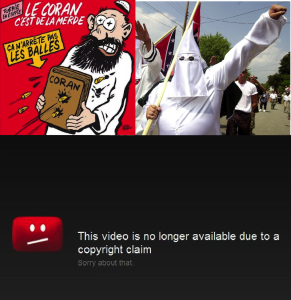All the recent headline coverage of the Charlie Hebdo terrorist attack and it’s free speech implications has got me thinking about how speech is regulated both through culture and through law. For example in the United States the government allows neo-Nazi groups to form and advocate their beliefs. Most Americans abhor the messages put out by these neo-Nazi groups, but most Americans also recognize the neo-Nazi’s freedom of speech. As a culture we generally discourage this type of speech by not doing business with these groups and disassociating ourselves from neo-Nazis. While neo-Nazi speech is legal we impose great costs and sanctions on those people that produce the neo-Nazi speech. Though I don’t know much about Charlie Hebdo I do view some of their cartoons as repugnant and deserving of such social sanctions.
Regardless of the specifics, we allow this type of speech under the law and depend on society to not propagate and encourage hateful messages. We use our public discourse, and developed cultural institutions, to police speech. However there is another kind of speech that is banned outright under the law, illegal speech that the government is very bullish about enforcing. This is speech that infringes on copyrights.
Instead of investing in an practical ethics surrounding the everyday copying, sharing, and remixing of information and art, we give the state the power to ban huge amounts of speech in the form copyright law enforcement. The public is not engaged in an ongoing discussion about what is, or is not, socially acceptable when it comes to remixing and sharing content. Instead the public is subjugated by the threat of corporate lawsuits that dictate which speech will be allowed and which will be banned.
Why do we trust the public to appropriately handled violent and hateful speech but not copyrighted speech? Just some food for thought.
 *I’m aware that there are also restraints on violent speech, and hate speech, but my point is only to draw contrast in the degree to which this speech is left to the “court of public opinion” compared to tightly legislated copyrighted speech.
*I’m aware that there are also restraints on violent speech, and hate speech, but my point is only to draw contrast in the degree to which this speech is left to the “court of public opinion” compared to tightly legislated copyrighted speech.
